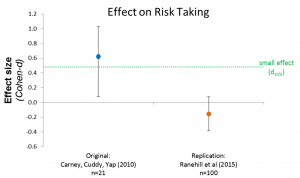May 13, 2015
Briefly
- Rating systems are the popular way to scale ‘reputation’ statistically so it works for internet transactions between people who don’t know each other. Tom Slee has a couple of pieces (via Cosma Shalizi): Some Obvious Things About Internet Reputation Systems and In praise of fake reviews:So the reviews that a restaurant owner believes are most likely to be fair are precisely the ones that Yelp judges to be untrustworthy….Unfortunately for restaurateurs, their opinions on trustworthy reviews are irrelevant. The company is not legally bound to be fair in its filtering and sorting activities,
- Another example of interesting results failing to replicate, this time from a popular TED talk about posture. As the post at Data Colada points out, this is a strong non-replication: it’s not just that they didn’t see they effect, they ruled out even much weaker effects. There’s a reason statisticians go on and on about over-interpretation of single, small studies.

- Looking at the Census data on religion, a map and set of stories from Lincoln Tan and Harkanwal Singh at the Herald
- A rather different form of data journalism, reported at Buzzfeed (or the original paper report here). The Telegraph had a ‘tactical voting tool’ that said who you should vote for if your goal was a Labour or Tory government. It was mostly honest, despite the paper’s well-known preferences. However, as Buzzfeed’s headline says: “The Telegraph’s Tactical Voting Tool Was Coded To Never Recommend The SNP”
- From the LA Times, Wylie Burke on “Why whole-genome testing hurts more than it helps” (disclosure: I once co-supervised a student with Prof Burke)
- A Slate article by a lawyer says Wyoming has ‘criminalized citizen science’ by creating a law against collecting and reporting environmental data. Now, Wyoming has created crimes of “unlawful collection of resource data” and “trespassing to unlawfully collect resource data”, but I’m pretty sure the Slate article exaggerates them. “Unlawful collection” can only happen on private land, which the article clearly gets wrong. “Trespassing to unlawfully collect” can happen on public land, but I’m not convinced that in the National Park example there isn’t the necessary authorisation to enter the land. Presumably the law does something or they wouldn’t have bothered passing it, and it’s probably something evil, but a better article would have been nice.
Thomas Lumley (@tslumley) is Professor of Biostatistics at the University of Auckland. His research interests include semiparametric models, survey sampling, statistical computing, foundations of statistics, and whatever methodological problems his medical collaborators come up with. He also blogs at Biased and Inefficient See all posts by Thomas Lumley »